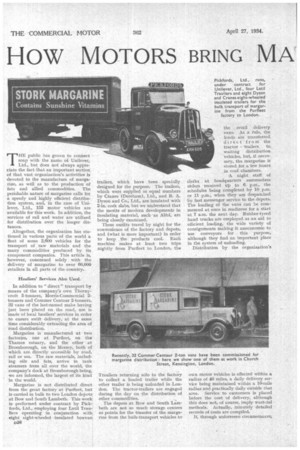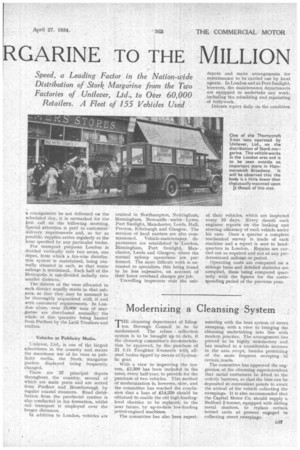How MOTORS BRING MA GARINE TO THE MILLION T HE public
Page 102

Page 103

If you've noticed an error in this article please click here to report it so we can fix it.
has grown to connect soap with the name of Unilever, Ltd., but does not always appreciate the fact that an important section. of that vast organization's activities is devoted to the manufacture of margarine, as well as to the production of fats and allied commodities. The perishable nature of margarine calls for a speedy and highly efficient distribution system, and, in the case of Unilever, Ltd., 155 motor vehicles are available for this work. In addition, the services of rail and water are utilized for distribution over the longer distances.
Altogether, the organization has stationed in various parts of the world a fleet of some 2,600 vehicles for the transport of raw materials and the many commodities produced by its component companies. This article is, however, concerned solely with the delivery of margarine to over 60,000 retailers in all parts of the country.
Hauliers' Services Also Used.
In addition to " direct " transport by means of the company's own Thornycroft 5-tonners, Morris-Commercial 2tonners and Com.mer Centaur 2-tonners, 32 vans of the last-named make having just been placed on the road, use is made of local hauliers' services in order to ensure swift delivery, at the same time considerably extending the area of road distribution.
Margarine is manufactured at two factories, one at Purfleet, on the Thames estuary, and the other at Bromborough, on the Mersey, both of which are directly accessible by road, rail or sea. The raw materials, including oils and fats, arrive in tank steamers from all over the world, the company's dock at Brornborough being, we are informed, the largest of its kind in the world.
Margarine is not distributed direct from the great factory at Purfleet, but is carried in bulk to two London depots at Bow and South Lambeth. This work is performed under contract by Pickfords, Ltd., employing four Latil TrauHers operating in conjunction with eight eight-wheeled insulated boxstan trailers, which have been specially designed for the purpose. The trailers, which were supplied in equal numbers by Cranes (Dereham), Ltd., and R A. Dyson and Co., Ltd., are insulated with 2-in, cork slabs, but we understand that the merits of modern developments in insulating material, such as Alfol, are being closely examined.
These outfits travel by night for the convenience of the factory and depots, and (what is more important) in order to keep the products cool. FA rli machine makes at least two trips nightly from Purfleet to London, the Trauliers returning solo to the factory to collect a loaded trailer while the other trailer is being unloaded in London. The tractor-trailers are engaged during the day on the distribution of other commodities.
The depots at Bow and South Lambeth are not so much storage centres as points for the transfer of the margarine from the bulk-transport vehicles to
A night staff of clerks at headquarters summarizes orders received up to 6. p.m., the schedules being completed by 10 p.m. or 11 p.m., when they are despatched by fast messenger service to the depots. The loading of the vans can be commenced at once in readiness for a start at 7 a.m. the next day. Rubber-tyred hand trucks are employed as an aid to efficient loading, the wide variety of consignments making it uneconomic to use conveyors for this purpose, although they find an important place in the system of unloading.
Distribution by the organization's
own motor vehicles is effected within a radius of 10 miles, a daily delivery service being maintained within a 10-mile radius and practically daily outside that area. Service to customers is placed before the cost of delivery, although this does not, of course, imply wasteful methods. Actually, minutely detailed records of costs are compiled.
If, through unforeseen circumstances,
a consignment be not delivered OA the scheduled day, it is earmarked for the Orst call on the following morning. Special attention is paid to customers' delivery requirements and, so far as possible, supplies arrive regularly at the hour specified by any particular trader.
For transport purposes London is divided vertically into two areas, one depot, from which a fan-wise distribution system is maintained, being centrally situated in each, so that waste mileage is minimized. Each half of the Metropolis is sub-divided radially into smaller districts.
The drivers of the vans allocated to each district usually reside in that subarea, so that they may be assumed to be thoroughly acquainted with, it and with customers' requirements. In Londonalone, over 15,000 tons of margarine are distributed annually; the whole of this quantity being hauled from Purfieet by the Lath l Trauliers and trailers.
• Vehicles as Publicity Media: Unilever, Ltd., is one of the largest advertisers in the country and makes the maximum use of its vans as publicity media, the Stork margarine posters displayed being frequently changed.
There are 27 principal depots throughout the country, several of which are main ports and are served frOm Purfleet and Bromborough by regular coastal steamers. Road distribution from the provincial centres is also conducted in fan formation, whilst rail transport is employed over the longer distances.
In addition to London, vehicles are centred in Northampton, No Birmingham, Newcastle und Port Sunlight, Manchester, Le Preston, Edinburgh and Glas services of local carriers are missioned. Vehicle-mainten partments are established in Birmingham, Port Sunligh chester, Leeds and Glasgow, normal upkeep operations formed. The more difficult w trusted to specialists, this bei to be less expensive, on ac their lower overhead charges Travelling inspectors visit
tingham, rLyme, ds, Hull, ow, The lso cornce deLondon, ,
Manhere the re perrk is eng found ount of r job.
e sub
of their vehicles, which are inspected every 10 days. Every Month each engineer reports on the braking and steering efficiency of each vehicle under his care. Once a quarter a complete mechanical survey is made of each machine and a report is sent to headquarters in London. Repairs are carried out as required and not at any predetermined mileage or period.
• Operating costs are computed on a mileage basis and detailed statistics are compiled, these being compared quarterly with the figures for the corresponding period of the previous year.




















































































































































































